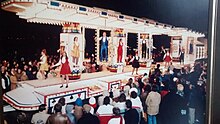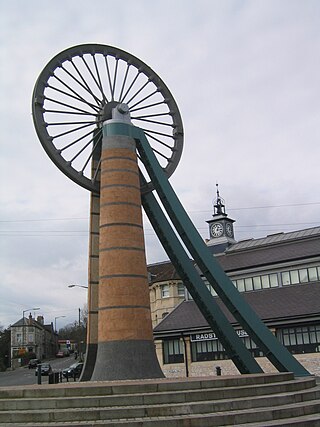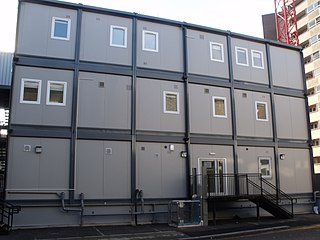
F. Pratten and Co Ltd, commonly known as Prattens, was a business located in Midsomer Norton that manufactured prefabricated buildings. Production included portable classrooms that were widely used after World War II.

F. Pratten and Co Ltd, commonly known as Prattens, was a business located in Midsomer Norton that manufactured prefabricated buildings. Production included portable classrooms that were widely used after World War II.

The business was founded in 1912 by 26 year old Frank Pratten, [1] a coal miner's son [2] from Westfield, [2] He had previously worked for another local firm, W. Edgell, but acquired a small premises off Charlton Road, Midsomer Norton, and began making prefabricated buildings with Frank Bourne. They manufactured ammunition sheds during World War I. [3]
Post war, Frank's brothers Ernest and Bertram joined the business. Economic difficulties during the inter-war years made low-cost prefabricated buildings attractive and business grew. [3] In 1922 the firm offered garages from as little a £12 15s delivered. [4] Prattens described itself as a "Horticultural Builders" [5] and between 1924 and 1926 incorporated as F Pratten & Co Ltd. [4]
During World War II, in common with many other workplaces, the company took on female factory workers to cover the shortfall left by men joining the armed forces.[ citation needed ]

Raising of the school leaving age in the UK to 15 in 1945 prompted the HORSA hut programme. The subsequent increase to 16 in 1972 led to ROSLA classroom blocks. Both generated demand for prefabricated classrooms.[ citation needed ] Expected lifespan of the huts was only twenty-five years [6] but many survived long after. Some examples from the 1950s – 1970s are still in use.[ when? ] [7] [8]
Prattens also manufactured sheds, greenhouses, office units and garages, which were exported throughout the world. [3] [4]
In 1968, the firm employed 250 staff and its factory was "completely mechanised in spite of being housed in old buildings". [9]
The company remained a family business until 1980 when it was sold to Beazer. The acquired firm's fortunes declined [ why? ] and the factory in Charlton Road was demolished in 1994 for housing development. [3]

Pratten Terrace is built at the former factory entrance and The Timbers opposite it, their names echoing the firm and its carpentry activities.
Two social clubs founded for Pratten's staff survive, both in Charlton Lane.[ when? ]
Prattens Sports and Social Club previously supported a Carnival Club that continued for some years after the firm closed. [10]

Prattens Bowls Club was started in 1928 by Mr Thomas, a cashier at Prattens, and built using voluntary labour. For many years it had a male-only membership, and the members had to be employed by Prattens. Membership of both clubs is now open to all.[ citation needed ] Prattens Bowls Club was the site of a fatal hot air balloon accident in 2011. [11]
A Pratten hut is used as community centre and live entertainment venue at Warminster Athenaeum.[ citation needed ]

A Nissen hut is a prefabricated steel structure originally for military use, especially as barracks, made from a 210° portion of a cylindrical skin of corrugated iron. It was designed during the First World War by the Canadian-American-British engineer and inventor Major Peter Norman Nissen. It was used also extensively during the Second World War and was adapted as the similar Quonset hut in the United States.

Radstock is a town and civil parish on the northern slope of the Mendip Hills in Somerset, England, about 9 miles (14 km) south-west of Bath and 8 miles (13 km) north-west of Frome. It is within the area of the unitary authority of Bath and North East Somerset. The Radstock built-up area had a population of 9,419 at the 2011 Census.

A modular building is a prefabricated building that consists of repeated sections called modules. Modularity involves constructing sections away from the building site, then delivering them to the intended site. Installation of the prefabricated sections is completed on site. Prefabricated sections are sometimes placed using a crane. The modules can be placed side-by-side, end-to-end, or stacked, allowing for a variety of configurations and styles. After placement, the modules are joined together using inter-module connections, also known as inter-connections. The inter-connections tie the individual modules together to form the overall building structure.

Boulton & Paul Ltd was a British general manufacturer from Norwich, England that became involved in aircraft manufacture.
Prefabrication is the practice of assembling components of a structure in a factory or other manufacturing site, and transporting complete assemblies or sub-assemblies to the construction site where the structure is to be located. Some researchers refer it to “various materials joined together to form a component of the final installation procedure“.

Midsomer Norton is a town near the Mendip Hills in Bath and North East Somerset, England, 10 miles (16 km) south-west of Bath, 10 miles (16 km) north-east of Wells, 10 miles (16 km) north-west of Frome, 12 miles (19 km) west of Trowbridge and 16 miles (26 km) south-east of Bristol. It has a population of around 13,000. Along with Radstock and Westfield it used to be part of the conurbation and large civil parish of Norton Radstock, but is now a town council in its own right. It is also part of the unitary authority of Bath and North East Somerset.

Cardington is a village and civil parish in the Borough of Bedford in Bedfordshire, England.

Prefabricated homes, often referred to as prefab homes or simply prefabs, are specialist dwelling types of prefabricated building, which are manufactured off-site in advance, usually in standard sections that can be easily shipped and assembled. Some current prefab home designs include architectural details inspired by postmodernism or futurist architecture.

A hut is a small dwelling, which may be constructed of various local materials. Huts are a type of vernacular architecture because they are built of readily available materials such as wood, snow, ice, stone, grass, palm leaves, branches, clay, hides, fabric, or mud using techniques passed down through the generations.

A portable classroom, is a type of portable building installed at a school to temporarily and quickly provide additional classroom space where there is a shortage of capacity. They are designed so they may be removed once the capacity situation abates, whether by a permanent addition to the school, another school being opened in the area, or a reduction in student population. Such buildings would be installed much like a mobile home, with utilities often being attached to a main building to provide light and heat for the room. Portable classrooms may also be used if permanent classrooms are uninhabitable, such as after a fire or during a major refurbishment.
Atlantis is a town in the Western Cape province of South Africa and is 40 km (25 mi) north of Cape Town. As of 2024, it has approximately 90,207 residents. Unemployment, lack of housing and crime are major challenges in the area.

A portable, demountable or transportable building is a building designed and built to be movable rather than permanently located.

A prefabricated building, informally a prefab, is a building that is manufactured and constructed using prefabrication. It consists of factory-made components or units that are transported and assembled on-site to form the complete building. Various materials were combined to create a part of the installation process.
The Bellman Hangar was designed in the United Kingdom in 1936 by the Directorate of Works structural engineer, N. S. Bellman, as a temporary aircraft hangar capable of being erected or dismantled by unskilled labour with simple equipment and to be easily transportable. Commercial manufacturing rights were acquired by Head Wrightson & Co of Teesdale Iron Works, Thornaby-on-Tees. By November 1938, 10 had even been supplied to Russia.
Offsite construction refers to the planning, design, manufacture and assembly of building elements at a location other than their final installed location to support the rapid speed of, and efficient construction of a permanent structure. Such building elements may be prefabricated offsite in a different location and transported to the site or prefabricated on the construction site and then transported to their final location. Offsite construction is characterized by an integrated planning and supply chain optimization strategy. Offsite manufacturing (OSM), offsite production (OSP) and offsite fabrication (OSF) are terms used when referring primarily to the factory work proper.

Shepherd Building Group Ltd is a family owned business, based in York, that manufactures, leases and sells modular buildings in the UK and Europe. Its Portakabin and Portaloo brands are frequently treated as generic terms for modular buildings and toilets.
Louis St Vincent Powell played first-class cricket for Somerset in 10 matches between 1927 and 1938. He was an all-round sportsman who also once played rugby for Bath Rugby Club. He was born at Kingstown, St Vincent and died at Bath, Somerset.

Westfield is a village and civil parish in Bath and North East Somerset in the ceremonial county of Somerset, England. The village lies on the Fosse Way between the towns of Radstock and Midsomer Norton.
Beazer was a family business for six generations before expanding in the 1980s into an international housebuilding, construction, and building materials group. After becoming overburdened with debt it was rescued by Hanson plc in 1991. A new Beazer Group, comprising solely the UK housebuilding business, was demerged from Hanson in 1994, and bought by Persimmon plc in 2001.
William Eassie (1805-1861) was a Scottish businessman of the mid 19th century, working as a railway contractor and then as a Gloucester-based supplier of prefabricated wooden buildings.